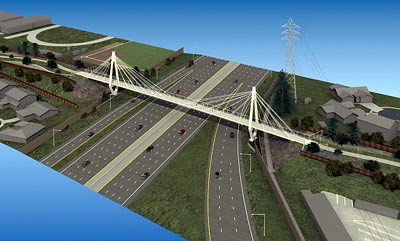This is where it can get sketchy. Normally, banks will set a stadium construction loan's interest rate based on revenue streams that will be used to pay it off. The more secure the sources, the better the terms. That's a big reason why, when putting together the revenue streams, teams will often move away from in-stadium revenue. Attendance and concession money is far less stable than a sales tax hike (at least normally it is, not so much this year). Wolff indicates that he has backup sources, but won't show his cards. Whatever the mix, the revenue mix will have to be clearly defined before a single dollar of a construction loan is given. It'll be interesting to see who provides the financing now that every investment bank has either folded, been acquired, or converted into a traditional bank. (For more on the death of the I-banks, check out the new piece in Condé Nast Portfolio by Moneyball writer Michael Lewis).
The Notice of Preparation for the final project plan is expected in a month. When asked why it was delayed, Wolff cited the election. Shrewd handling of a political football? Sneaky dealings? Given the small percentage of the electorate that actually reads such documents, I believe the impact would've been small in either a positive or negative manner.
Artz calls attention to how the ProLogis stock price has dropped from nearly $72 to $5 in only six months. While startling, the decline should be kept in perspective. ProLogis is still going to pay out a dividend to its shareholders, which is more than can be said for a lot of companies. Their main industries are real estate and warehousing. With products generally not moving due to the credit crunch and its cascading effects, ProLogis was going to take a major hit. Growth will be slow as they aren't developing anything on their own in the near term. As the gears of the economy start moving again, ProLogis will as well.
I've touched briefly on the idea of the A's moving a major parking lot to an area across 880 from the baseball village. I puzzled at why that would be the case at first. My guess at this point is that they're feeling pressure to move as much traffic away from Auto Mall Parkway as possible, and by moving parking away from Auto Mall, traffic would be siphoned to boot. Problem with this is that by moving parking across the freeway to the east, they get closer to NUMMI. Forget yesterday's report that the plant will cut production in response to the economic downturn, NUMMI will rebound at some point thanks to it being mostly a Toyota plant. NUMMI considers itself a 24/7 operation, so anything that could potentially impact production or product/parts movement is cause for alarm. Considering how infrequent the use of this parking lot would be (90 times per year, half the time between 6 and 11 p.m., one-third on weekends), any concerns would seem to be overblown. Despite this, it's well within NUMMI's right to share their concerns and for the A's and the city to devise a way to mitigate any impacts.
On a related note, the pedestrian overpass concept will likely cost at least $10 million depending on its width and load. Cupertino is completing what looks like a miniature version of Boston's Zakim Bunker Hill Bridge over 280.

Something tells me the A's might build something more utilitarian, but this one also has one very important design characteristic: it doesn't need a column in the freeway median. They could also choose to make such a bridge wide enough to carry parking trams.
